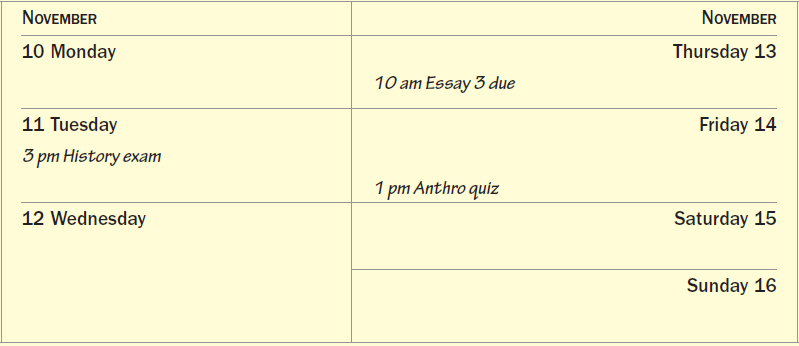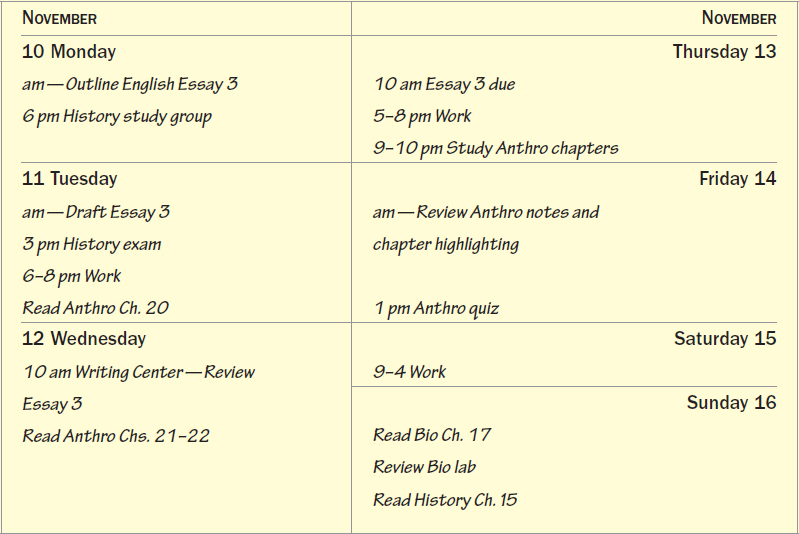Strategies for Success
“The New Marshmallow Test” demonstrates the importance of focusing your attention while in the classroom, but there are strategies for college success that you can embrace even before you enter the classroom that will help you learn more effectively and efficiently. These strategies are presented in this section.
MANAGE YOUR TIME EFFECTIVELY
As you discovered in “The New Marshmallow Test,” using your study time efficiently, without media distractions, is important. Setting aside enough time — for every hour spent in class, plan to work two to three hours outside of class — and planning that time carefully are also crucial. The best way to get started is to establish goals and create a workable plan for achieving those goals.
Examine the two student schedules shown in Figures 1.1 and 1.2. Which student is more likely to meet his or her deadlines? Why?
The planner in Figure 1.1 shows only test dates and assignment deadlines, whereas the planner in Figure 1.2 includes not only tests and deadlines but also details showing how and when the student will meet those deadlines. The student who uses the planner in Figure 1.2 is more likely to complete his or her work on time — and with less worry.


Plan your schedule. Each time you sit down to study for a class, assess what you need to do, and determine the most effective order in which to do it. Work on the most challenging assignments first, when your concentration is at its peak. You should plan to study six to eight hours per week for each course. Study for each course during the same time period each week, if possible, to establish a routine. Alternatively, you may want to take ten minutes at the beginning of each week to specify the six to eight hours in which you’ll work on each course.
Avoid procrastination. Procrastination is putting off things that need to be done; you know you should work on an assignment, but you do something else instead. To avoid procrastination, try these tips.
- Divide the task into manageable parts.
- Avoid making excuses. It is easy to say you don’t have enough time to get everything done, but often that is not true.
- Avoid escaping into routine tasks such as shopping, cleaning, or washing your car rather than completing the task.
ORGANIZE A WRITING AND STUDY AREA
You don’t need a lot of room to create an appropriate space for studying and writing, but you do need a space that is conducive to writing and studying. Your work area should be:
- quiet so you won’t be disturbed by family or roommates or be tempted to turn on your television or play with your cat,
- well lit and spacious enough to accommodate your books, notebooks, and computer, and
- equipped with all the tools you need: a clock, a computer, a calculator, pens, pencils, paper, a pencil sharpener.
If your home does not fit the bill, consider studying in the library. Libraries offer carrel space, and many also offer study rooms for group work or secluded areas with comfortable chairs if you do not need a desk. The library also offers a convenient spot to study between classes.
STUDY MORE EFFICIENTLY
Does either of these situations sound familiar?
“I just read a whole page, and I can’t remember anything I read!”
“Every time I start working on this assignment, my mind wanders.”
If so, you may need to improve your concentration. No matter how intelligent you are or what skills or talents you possess, if you cannot keep your mind on your work, your classes — including your writing class — will be unnecessarily difficult. In addition to shutting down distracting media, try the following strategies to help you “study smarter,” not harder.
- Work at peak periods of attention. Identify the time of day or night that you are most efficient and focused. Avoid working when you are tired, hungry, or distracted.
- Vary your activities. Do not complete, say, three reading assignments consecutively. Instead, alternate assignments: for example, read, then write, then work on math problems, then read another assignment, and so on.
- Use writing to keep you mentally and physically active. Highlight, annotate, and take notes as you read. These processes will keep you mentally alert.
- Approach assignments critically. Ask yourself questions as you read. Make connections with what you have already learned and with what you already know about the subject. You will learn more about synthesis, a crucial component of learning effectively, later in this chapter.
- Challenge yourself with deadlines. Before beginning an assignment, estimate how long it should take and work toward completing it within that time limit.
- Keep a to-do list. When you are working on an assignment, stray thoughts about other pressing things (tomorrow’s car inspection, next week’s birthday party for your mother) are bound to zip through your mind. When these thoughts occur to you, jot them down so that you can unclutter your mind and focus on your work.
- Reward yourself. As Professor Rosen (in “The New Marshmallow Test”) suggests, use a fun activity, such as texting a friend or getting a snack, as a reward for reaching your goal or completing your assignment.
LEARN TO MANAGE STRESS
Stress is a natural reaction to the challenges of daily living, but if you are expected to accomplish more or perform better than you think you can, stress can become overwhelming. As a successful student, you need to monitor your stress. Take the “How Stressed Are You?” quiz to assess your stress level.
| Quiz: How Stressed Are You? | Always | Sometimes | Never |
| 1. I worry that I do not have enough time to get everything done. | |||
| 2. I regret that I have no time to do fun things each week. | |||
| 3. I find myself losing track of details and forgetting due dates, promises, and appointments. | |||
| 4. I worry about what I am doing. | |||
| 5. I have conflicts or disagreements with friends or family. | |||
| 6. I lose patience with small annoyances. | |||
| 7. I seem to be late, no matter how hard I try to arrive on time. | |||
| 8. I have difficulty sleeping. | |||
| 9. My eating habits have changed. | |||
| 10. I find myself needing a cigarette, drink, or prescription drug. |
You can use stress to motivate yourself to start a project or assignment, or you can let it interfere with your ability to function mentally and physically. If you answered “Always” or “Sometimes” to more than two or three items in the “How Stressed Are You?” quiz, you may be reacting to stress negatively. Here are some effective ways to change your thinking and habits to reduce stress.
- Establish your priorities. Let’s say, for example, that you decide college is more important than your part-time job. Once you have decided this, you won’t worry about requesting a work schedule to accommodate your study schedule because studying is your priority.
- Be selfish and learn to say no. Use your priorities to guide you in accepting new responsibilities.
- Simplify your life by making fewer choices. For example, instead of deciding what time to set your alarm clock each morning, get up at the same time each weekday. Set fixed study times and stick to them.
- Focus on the positive. Instead of saying “I’ll never be able to finish this assignment on time,” ask yourself, “What do I have to do to finish this assignment on time?”
- Separate work, school, and social problems. Create mental compartments for your worries. Don’t spend time in class thinking about a problem at work or a conflict with a friend. Deal with problems at the appropriate time.
- Keep a personal journal. Writing down details about your worries and emotions can go a long way toward relieving stress, but be sure to include notes about how you can resolve problems too.